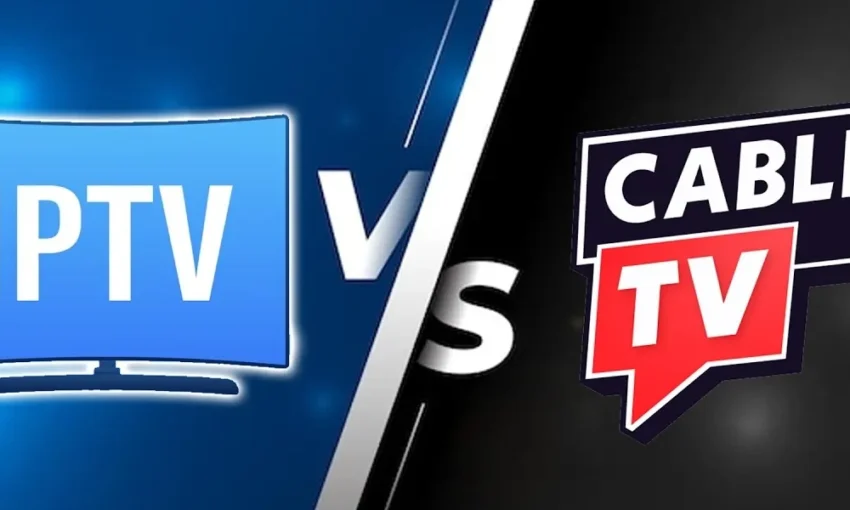IPTV vs Cable TV UK: Television has long been an essential part of daily life in the UK. Over the years, the way people watch TV has changed significantly. Traditional cable TV has been the go-to option for decades, but IPTV (Internet Protocol Television) is quickly becoming a strong alternative. More and more UK households are switching to IPTV for its flexibility and cost-effectiveness.
However, choosing between IPTV and cable TV is not always easy. Both have their pros and cons, and what works best for one person may not be ideal for another. This article will compare IPTV vs. cable TV in the UK based on key factors such as content availability, cost, device compatibility, and viewing experience. By the end of this guide, you will have a clearer understanding of which service is better suited to your needs.
Understanding IPTV and Cable TV
What is IPTV and How Does It Work?
IPTV is a modern way to watch television, using internet-based streaming instead of traditional cable or satellite. With IPTV, content is delivered over an internet connection, allowing users to stream live TV, video on demand (VOD), and time-shifted content.
One of the biggest advantages of IPTV is that it does not require a satellite dish or coaxial cable. Instead, users can access IPTV services on smart TVs, computers, smartphones, tablets, and even gaming consoles. This makes it a versatile and flexible option for viewers who want to watch TV from anywhere.
What is Cable TV and How Does It Work?
Cable TV transmits television signals through coaxial cables directly into a set-top box. This traditional method has been around for decades and is still widely used across the UK. With cable TV, channels are delivered through fixed packages, meaning viewers must choose from pre-selected bundles rather than customizing their selection.
Cable TV is reliable and does not rely on internet speed for quality, making it a stable option for households that prefer a traditional TV experience. However, it does come with higher costs and limited on-demand options compared to IPTV.
Key Differences Between IPTV and Cable TV in the UK
1. Content Delivery Method
- IPTV: Uses internet-based streaming, requiring a stable broadband connection.
- Cable TV: Uses physical coaxial cables to transmit signals.
2. Content Availability and On-Demand Options
- IPTV: Provides access to thousands of on-demand titles, including movies, TV series, and catch-up content.
- Cable TV: Limited on-demand services, usually requiring extra subscriptions for premium content.
3. Interactivity and Viewing Experience
- IPTV: Offers interactive features such as pause, rewind, fast-forward, and cloud DVR for recording shows.
- Cable TV: Provides a fixed viewing schedule, and DVR options are often limited to higher-tier packages.
4. Cost and Subscription Models of IPTV vs Cable TV
- IPTV: Usually offers flexible, contract-free subscription plans, with pricing based on content selection.
- Cable TV: Requires long-term contracts, with higher monthly costs and potential hidden fees.
5. Device Compatibility and Accessibility of IPTV vs Cable TV
- IPTV: Works on multiple devices, including smart TVs, smartphones, Firestick, and computers.
- Cable TV: Requires a set-top box, restricting viewing to one or two televisions per household.
Advantages and Disadvantages of IPTV vs Cable TV
Advantages of IPTV
Flexibility – Watch TV anywhere, anytime, on different devices.
More Content – Access live TV, international channels, and VOD libraries.
Lower Cost – Often cheaper than cable TV, with no installation fees.
Interactive Features – Ability to pause, rewind, or record shows.
Disadvantages of IPTV
❌ Internet Dependent – A slow connection can cause buffering issues.
❌ Service Variability – Not all IPTV providers offer consistent streaming quality.
Advantages of Cable TV
✔️ Stable Connection – No buffering issues, as it does not rely on the internet.
✔️ Reliable Service – Fewer service disruptions compared to IPTV.
Disadvantages of Cable TV
❌ Higher Costs – Expensive monthly fees, plus extra charges for premium channels.
❌ Less Flexibility – Limited on-demand options and fixed programming schedules.
Market Trends: The Shift from Cable TV to IPTV in the UK
More UK viewers are making the switch from cable TV to IPTV. One major reason is the rising cost of cable subscriptions. Many households are looking for affordable, contract-free alternatives, and IPTV provides the flexibility they need.
Additionally, the growing demand for on-demand content has made IPTV more attractive. Services like Netflix, Amazon Prime, and Disney+ have changed the way people consume TV, and IPTV follows this trend by offering instant access to content instead of relying on scheduled programming.
Legal and Regulatory Considerations for of IPTV vs Cable TV
Before switching to IPTV, it is important to understand the legal aspects of using IPTV services. In the UK, only IPTV providers with proper licensing agreements are legal. Many IPTV services that offer unrealistically low prices and thousands of premium channels without proper rights operate illegally.
How to Identify a Legal IPTV Provider
- The service is licensed by UK authorities and follows copyright laws.
- It does not require a VPN to bypass geo-restrictions.
- Subscription prices are reasonable and similar to mainstream streaming services.
For more insights into legal IPTV services in the UK, check out this detailed IPTV legality guide.
Which Service is Right for You?
IPTV: Best for Flexibility and On-Demand Viewing
If you prefer a modern TV experience, IPTV is the better choice. It offers on-demand content, live streaming, and multi-device access, making it perfect for those who want entertainment on the go. Additionally, lower costs and contract-free options make IPTV a budget-friendly alternative to cable TV.
Cable TV: Best for Stability and Traditional Viewing
Cable TV is ideal for viewers who prioritize stability over flexibility. If you don’t want to worry about internet speeds affecting your TV experience, cable is a reliable choice. However, it lacks the on-demand convenience and affordability that IPTV provides.
Make the Right Choice Based on Your Needs
Ultimately, the decision between IPTV and cable TV depends on your viewing habits and budget. If you enjoy streaming content on different devices and want lower costs, IPTV is the way to go. On the other hand, if you prefer a traditional TV setup with consistent performance, cable TV might be the better fit.
If you’re considering IPTV but need help finding a reliable provider, check out this complete IPTV provider guide.
FAQs About IPTV vs. Cable TV in the UK
1. What is the main difference between IPTV and cable TV?
IPTV streams TV via the internet, while cable TV uses coaxial cables for transmission.
2. Can I watch live sports on IPTV?
Yes! Many IPTV providers offer live sports channels and pay-per-view events.
3. Is IPTV legal in the UK?
Yes, but only if the provider has official broadcasting rights.
4. Do I need a fast internet connection for IPTV?
For HD streaming, at least 10-15 Mbps is recommended. For 4K content, 25 Mbps or more is ideal.
5. Can I cancel my IPTV subscription anytime?
Most IPTV providers offer monthly plans, so you can cancel without long-term commitments.
For more details on how IPTV works, read this IPTV setup guide.
Conclusion: Choosing Between IPTV and Cable TV in the UK
IPTV is the Future of Television
More people in the UK are switching to IPTV because it offers flexibility, affordability, and convenience. Unlike cable TV, which ties viewers to scheduled programming, IPTV allows them to watch content on-demand, anytime, and on multiple devices. With the rise of high-speed internet and smart devices, IPTV is becoming the preferred choice for modern entertainment. If you want instant access to live TV, sports, and thousands of movies and series, IPTV is the better option.
Cable TV Still Offers Stability
While IPTV offers more features, cable TV remains a reliable choice for those who prefer a traditional TV experience. Cable TV does not rely on internet speed, so users never have to worry about buffering or connectivity issues. It also provides a familiar and simple setup, which many older viewers prefer. However, higher subscription costs, limited content choices, and long-term contracts make it less attractive to people looking for a more flexible TV solution.
Your Viewing Habits and Budget Matter
The best choice depends on your personal needs, budget, and viewing habits. If you love streaming movies, watching live sports, and having the freedom to watch TV anywhere, IPTV is the clear winner. But if you prefer a stable and consistent TV experience without relying on the internet, cable TV might still be the right choice for you. When choosing between the two, consider factors like cost, content selection, device compatibility, and contract terms.
Make an Informed Decision
Before making a decision, research your options carefully. Check the content lineup, read customer reviews, and compare pricing plans. If you choose IPTV, make sure to select a legal and reliable provider that offers high-quality streaming and good customer support. If you prefer cable TV, look for a provider that offers reasonable pricing and flexible packages. No matter which service you choose, make sure it fits your entertainment needs and budget. If you want to explore the best IPTV providers in the UK, check out this detailed IPTV provider guide.

